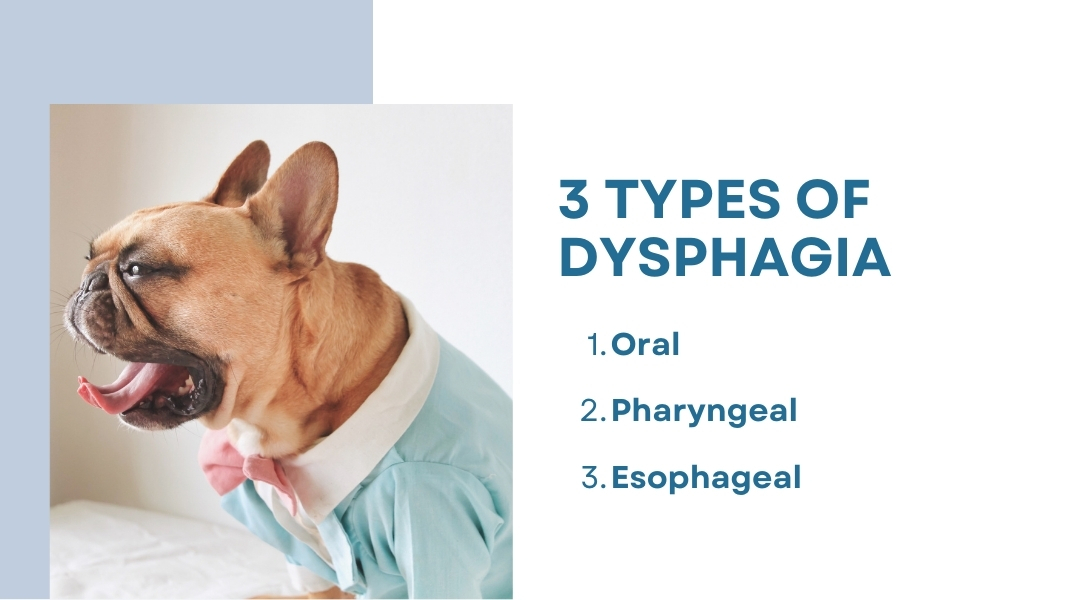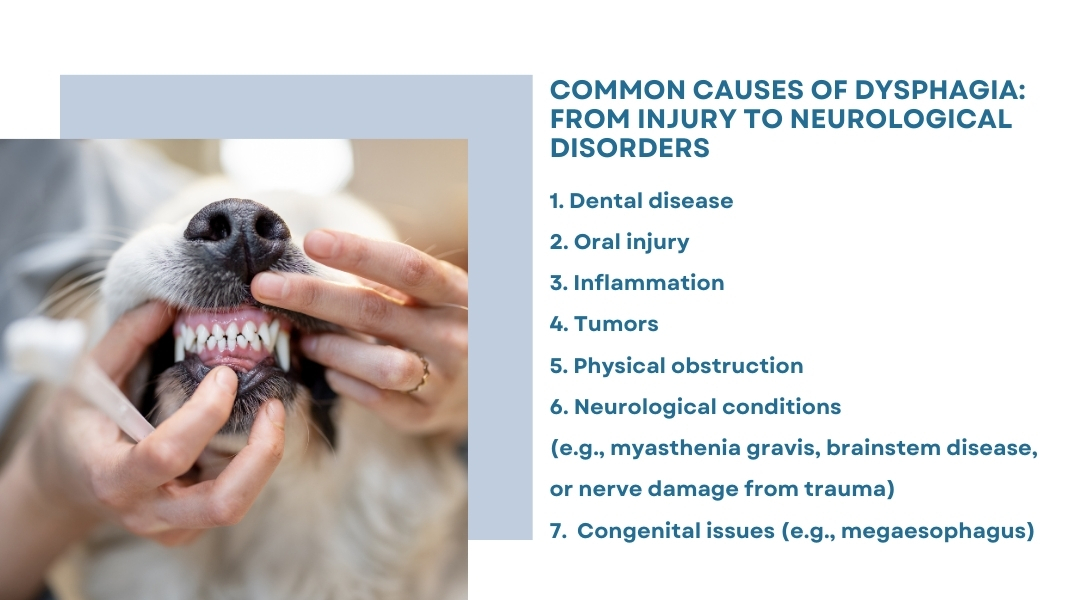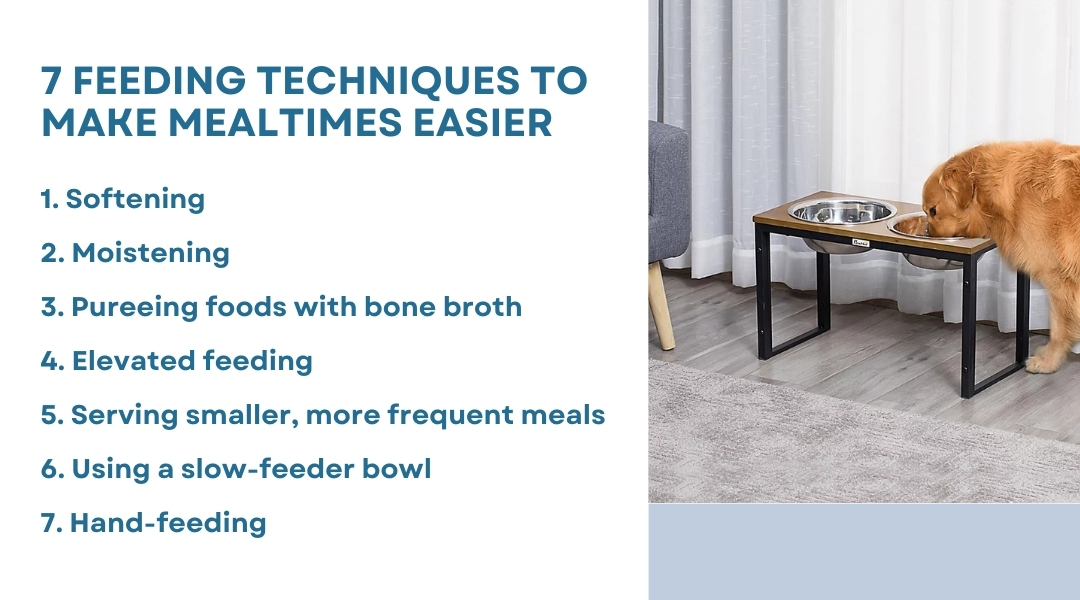Canine Dysphagia: What Is It And How To Manage It
Posted by Volhard Dog Nutrition on May 19th 2025
Watching your dog struggle to swallow can be heartbreaking. Whether it’s a reluctance to eat, frequent gagging during meals, or difficulty swallowing—known as dysphagia—can affect dogs of any age or breed.
In this guide, we’ll explore practical strategies to support dogs with dysphagia, from adjusting food textures to choosing supplements that promote overall digestive wellness.
What is Dysphagia in Dogs?
In dogs, this condition can affect any part of the swallowing process, from the mouth and throat to the esophagus. You might notice your dog dropping food, gagging, coughing after eating, or showing signs of pain when trying to swallow.

3 Types of Dysphagia
1. Oral
This type affects a dog’s ability to chew and manipulate food inside the mouth.
Dogs with oral dysphagia may drop food frequently, chew awkwardly, or struggle to close their mouths properly.
Common signs of oral dysphagia:
- Dropping food while eating.
- Difficulty chewing or moving food to the back of the mouth.
- Excessive drooling or food buildup in the cheeks.
2. Pharyngeal
Pharyngeal dysphagia involves the throat (pharynx), where food should pass smoothly from the mouth into the esophagus. If this step is disrupted, food or water may be misdirected into the airway, increasing the risk of choking or aspiration.
Common signs of pharyngeal dysphagia:
- Gagging or retching after swallowing.
- Coughing during meals.
- Nasal discharge from food entering the nasal cavity.
3. Esophageal
This type affects the esophagus (i.e., the muscular tube that moves food from the throat to the stomach).
Dogs with esophageal dysphagia often regurgitate undigested food shortly after eating.
Common signs of esophageal dysphagia:
- Regurgitation (often mistaken for vomiting).
- Weight loss despite a good appetite.
- Signs of aspiration pneumonia (coughing, lethargy, fever).
Common Causes of Dysphagia: From Injury to Neurological Disorders

Dysphagia in dogs can be caused by a wide range of underlying health issues, making an accurate diagnosis essential for proper care.
Sometimes, the cause is as straightforward as dental disease or an oral injury, issues that make it painful or mechanically difficult for a dog to chew and swallow.
In other cases, the root problem may lie deeper in the throat or esophagus, such as inflammation, a tumor, or a physical obstruction.
Neurological conditions are another common culprit, especially when the nerves or muscles involved in the swallowing process are impaired. Disorders like myasthenia gravis, brainstem disease, or nerve damage from trauma can all interfere with the coordinated movement required for swallowing.
Congenital issues, such as megaesophagus, may also be diagnosed in younger dogs and require lifelong management.
Nutritional Strategies for Dogs With Dysphagia
One of the easiest foods for dogs with dysphagia to eat is Volhard’s NDF2. Our rehydrated foundation mix is easy for dogs to swallow.
Rescue is also a healthy choice, although we recommend pureeing or grinding the vegetables to help ease the feeding process. The Rescue diet will help manage inflammation and limit allergy triggers that may exacerbate the condition.
3 Supplements That May Support Swallowing Function
One beneficial supplement is krill oil, a rich source of Omega-3 fatty acids. These healthy fats have anti-inflammatory properties that can reduce irritation in the throat or esophagus and may contribute to better muscle function.
In dogs with neurological causes of dysphagia, supplements that support nerve health, such as B-complex vitamins and antioxidants like vitamin E, can also help maintain nerve signal transmission and muscle control.
Digestive enzymes and probiotics may help dogs prone to regurgitation or gastrointestinal upset by breaking down food more efficiently, which reduces stress on the esophagus.
7 Feeding Techniques to Make Mealtimes Easier

For dogs with oral or pharyngeal dysphagia, softening, moistening, or pureeing foods with bone broth can help minimize chewing effort and reduce the risk of choking.
For dogs with esophageal issues like megaesophagus, elevated feeding, where the dog eats from a raised platform or in a vertical position, can allow gravity to assist in moving food to the stomach.
Serving smaller, more frequent meals can help prevent regurgitation and reduce pressure on the esophagus. It’s also essential to keep your dog calm during and after meals. Limit activity and encourage them to remain upright for at least 15–20 minutes after feeding if they have esophageal dysphagia.
Using a slow-feeder bowl or hand-feeding can provide more control and allow you to monitor how well your dog is managing their food.
Rebuild Comfort and Confidence at Mealtime With Volhard Dog Nutrition!
Support your dog’s swallowing health with our nutrient-rich, easy-to-digest meals and supplements designed to nurture the digestive system and reduce discomfort.
For more advice on dog nutrition, health, and training, contact us and check out our other blogs!
Volhard Dog Nutrition and its expert canine nutrition coaches offer online consultations to help more dog parents discover why and how to feed their dogs the healthiest foods!
Speaking to a Volhard canine nutrition coach will help you understand the inseparable relationship between healthy food, a healthy body, and a healthy mind.
If you want to contact one of our Volhard canine nutrition coaches, don't hesitate to access our consultation page!
References:
- "Dysphagia in Dogs." Tierarzt Karlsruhe - Kleintierzentrum Arndt, 20 Nov. 2023, tierarzt-karlsruhe-durlach.de/en/dysphagia-in-dogs/. Accessed 24 Apr. 2025.
- "Dysphagia in Dogs: Causes, Symptoms & Treatment." Pets4Homes, Pets4Homes, 27 Mar. 2025, www.pets4homes.co.uk/pet-advice/dysphagia-in-dogs.html. Accessed 24 Apr. 2025.
- Rational Approach and Dietary Considerations for Managing Dogs with Swallowing Impairment (Dysphagia), www.advancesinsmallanimalcare.com/article/S2666-450X(24)00010-5/fulltext. Accessed 24 Apr. 2025.
- "Swallowing Difficulties in Dogs." PetMD, www.petmd.com/dog/conditions/mouth/c_dg_difficulty_swallowing. Accessed 24 Apr. 2025.

